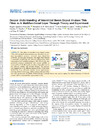Please use this identifier to cite or link to this item:
https://accedacris.ulpgc.es/jspui/handle/10553/107986
| Title: | Deeper Understanding of Interstitial Boron-Doped Anatase Thin Films as A Multifunctional Layer Through Theory and Experiment | Authors: | Quesada Cabrera, Raúl | UNESCO Clasification: | 2307 Química física | Issue Date: | 2018 | Journal: | Journal of Physical Chemistry C | Abstract: | Thin films of interstitial boron-doped anatase TiO2, with varying B concentrations, were deposited via one-step atmospheric pressure chemical vapor deposition (APCVD) on float glass substrates. The doped films showed a remarkable morphology and enhanced photoactivity when compared to their undoped analogues. The TiO2:B films also presented enhanced conductivity and electron mobility as measured by a Hall effect probe as well as a high adherence to the substrate, stability and extended lifetime. The structure and composition of the different samples of TiO2:B films were studied by X-ray diffraction (XRD), Raman spectroscopy, scanning electron microscopy (SEM), and dynamic secondary ion mass spectrometry (D-SIMS). Hybrid density functional theory was used to explore the defect chemistry of B-doped anatase and to understand the experimental results. | URI: | https://accedacris.ulpgc.es/handle/10553/107986 | ISSN: | 1932-7447 | DOI: | 10.1021/acs.jpcc.7b11142 | Source: | Journal Of Physical Chemistry C [ISSN 1932-7447], v. 122, p. 714-726 |
| Appears in Collections: | Artículos |
SCOPUSTM
Citations
19
checked on Jun 8, 2025
WEB OF SCIENCETM
Citations
21
checked on Feb 22, 2026
Page view(s)
216
checked on Jan 15, 2026
Download(s)
393
checked on Jan 15, 2026
Google ScholarTM
Check
Altmetric
Share
Export metadata
Items in accedaCRIS are protected by copyright, with all rights reserved, unless otherwise indicated.
